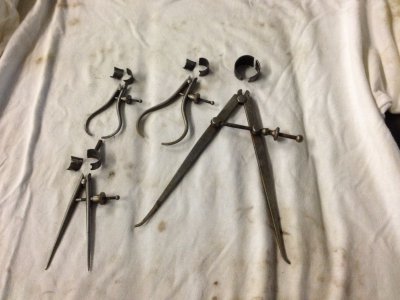Recently I bought some vintage machinist calipers on Ebay. There were some spring type toolmaker's style by Lufkin and some Yankee style by Starrett from two different sellers. Some of both lots were lightly rusted and grimey so I thought I'd try using vinegar for rust removal. I had read that it does a good job without removing base metal and I hoped that it would remove the rust without otherwise marring the finish. I soaked several of them in regular household white vinegar overnight. As advertized, the vinegar did a great job on the rust. Unfortunately, I found 4 of the spring "bows" snapped in two. One of four Starretts broke (the other three seem fine) and all 3 of the Lufkins. I have the utmost respect for these old tools and am saddened to think I (unwittingly) destroyed them by trying to return them to a usable state. I found a similar Starrett caliper in their current catalog so I am hoping that I can get a replacemet bow. I am not so hopeful for the Lufkins. 
Can anyone explain to me what happened? I am completely mystified as to what would cause the bows to break whilebsoaking in a mild vinegar solution. Also, if anyone knows how I might obtain replacements for the Lufkin bows, I would be grateful.
Here's a picture of the damage:


Can anyone explain to me what happened? I am completely mystified as to what would cause the bows to break whilebsoaking in a mild vinegar solution. Also, if anyone knows how I might obtain replacements for the Lufkin bows, I would be grateful.
Here's a picture of the damage:



